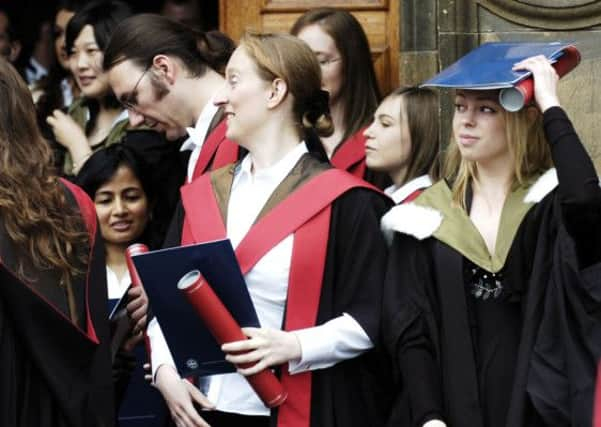Tuition fees post-independence may face EU probe


Experts in European law claim the plans, contained in the Scottish Government’s White Paper, are discriminatory.
At the end of last year, the White Paper outlined plans to continue the current system whereby Scots and EU students receive free higher education.
Advertisement
Hide AdAdvertisement
Hide AdThe only students from within the EU who would not be entitled to free tuition are those from elsewhere in the United Kingdom.
The SNP argues that it is necessary to charge English, Welsh and Northern Irish students because of Scotland’s proximity to the countries making up the rest of the UK and the high tuition fees imposed south of the Border by the Westminster government.
Senior figures in the Scottish Government say that if Scotland did not charge students from the rest of the UK, Scottish students would be crowded out of universities in their own country.
However, the plans have been criticised by academics who claim that the legal position will change should Scotland become independent.
EU rules prohibit states from discriminating on the grounds of nationality, meaning that Scotland has to give free higher education to EU students outwith the UK in order to keep tuition free for Scottish students.
The EU laws, however, do not apply within EU member states, giving the Scottish Government power to impose tuition fees on students from England, Wales and Northern Ireland.
The White Paper proposes that the current fees arrangement continues even after independence.
Tomorrow, a group which is arguing for the UK under the banner of Academics Together, will publish a paper raising questions about the legality of the White Paper’s proposal.
Advertisement
Hide AdAdvertisement
Hide AdYesterday Academics Together, which has 150 members, called on the Scottish Government to publish any legal advice they have on the issue.
Spokeswoman Professor Susan Shaw, former vice-principal of the University of Strathclyde said: “All the evidence points to the fact that Alex Salmond’s assertions on tuition fees don’t stand up to scrutiny.
“The Scottish Government should publish any legal advice on charging students in the rest of the UK tuition fees if we go it alone, if any such advice even exists.
“There is a real risk that the loss of funding from students in the rest of the UK would have negative consequences on our ability to teach Scotland’s students.
“The great irony of this issue is that the only way for the Scottish Government to guarantee its policy on tuition fees stays in place is for Scotland to remain in the UK.”
She added: “Independence is a gamble we don’t need to take. Our universities are thriving as part of the UK. Why would we want to give up the strength and security of the UK for the risk and uncertainty of independence?”
Two eminent legal experts, who are unconnected to Academics Together, have criticised the proposal in recently published blogs.
Paul Beaumont, professor of European law at the University of Aberdeen, wrote: “It is hard to see the Court of Justice of the EU accepting the Scottish Government’s arguments as to how this overt discrimination against students from rUK can be justified.
Advertisement
Hide AdAdvertisement
Hide Ad“There is, therefore, a substantial hole in the Scottish Government’s plans for funding higher education in Scotland.”
While Niamh Nic Shuibhne, professor of European Union law at the University of Edinburgh, blogged: “The Scottish Government would face an extremely steep uphill battle to convince the EU institutions that it should be entitled to retain a practice involving systemic direct discrimination against one particular cohort of EU citizens.”
Last night, a spokesman for the Education Secretary Michael Russell said: “The White Paper is consistent with, and informed by, legal advice the government has received. The content of any legal advice is confidential. By long-standing convention, successive Scottish and Westminster governments have not disclosed the source or content of legal advice other than in the most exceptional circumstances.
“There is, however, very clear legal opinion already published by the universities themselves on this issue. It makes clear the possibility of continuing the current system within EU law.
“It is entirely legitimate, of course, for people to express other views and that is a debate we welcome. What is a nonsense is for the No camp to ignore the substantial and credible advice provided to Universities Scotland – a body of impeccable neutrality on the question of independence. Instead, they are trying to generate a scare story from Academics Together – every one of whom is signed up to the No Campaign and putting forward arguments against Scottish independence.”
He added: “When the universities themselves acknowledge that there is a good basis for this policy, the No camp should quit their self-styled Project Fear approach.
“Instead, they should adopt the much promised positive campaign and welcome the strength of Scotland’s world-class higher education system as a key plank in our future economic success.”